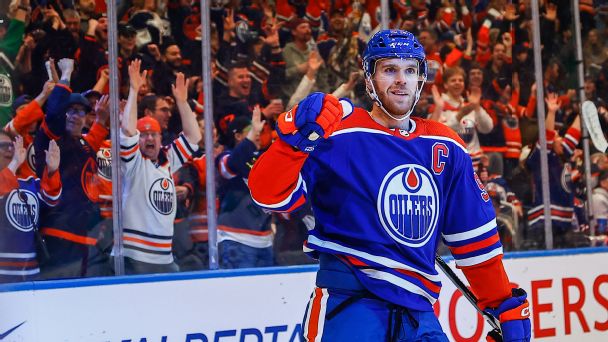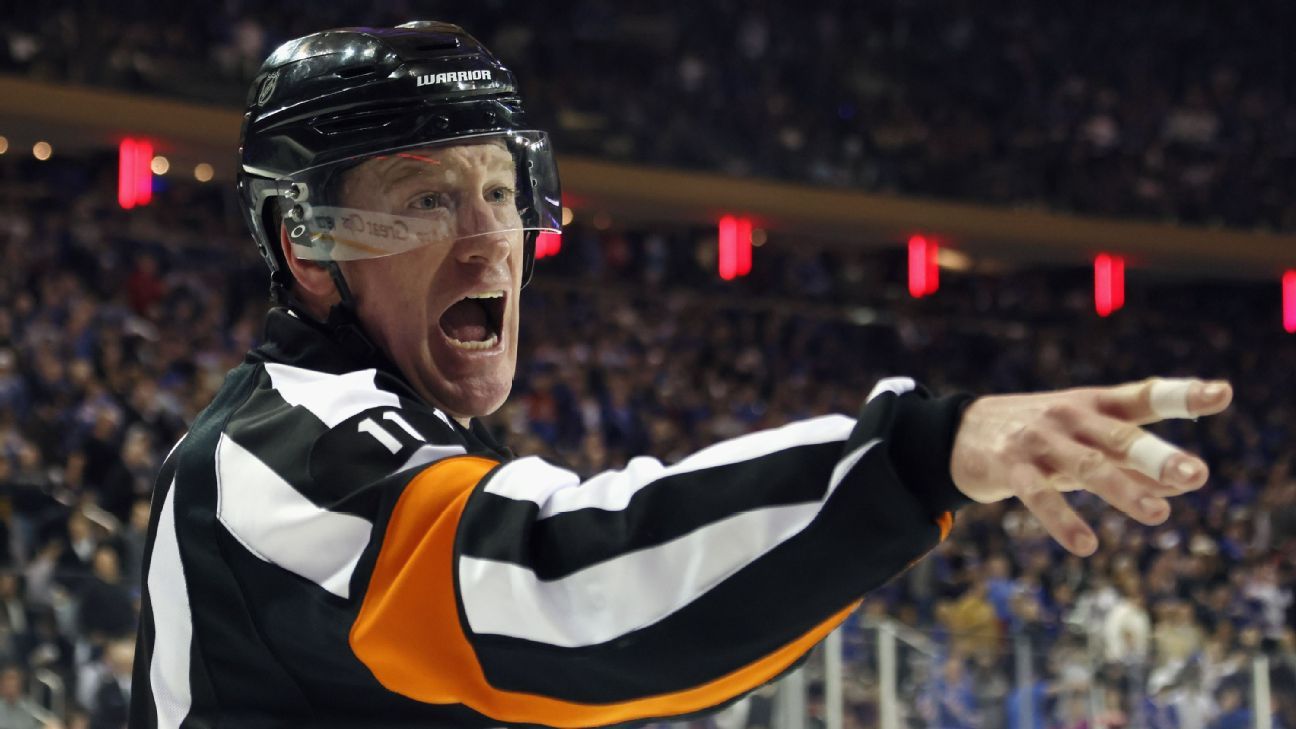
Complaining about
The playoffs are here. Get caught up on all the latest news and preview content:
• Schedule, scores, highlights
• Inside the Battle of the Hudson
• Wyshynski’s playoff bracket
• Top 50 players in the playoffs
• Updated series odds, Cup futures
• Subscribe to ESPN+
• Stream the NHL on ESPN
Jackson remembers back in 2005 when Walkom helped establish a new standard for officiating that extended to playoff overtimes, telling the referees that if they see something that crosses the standard for enforcement, blow the whistle. He said Walkom and NHL commissioner Gary Bettman stress that to the officials before every postseason.
But playoff overtimes are called sudden death for a reason: Postseason life can be extinguished with a power-play goal. Jackson said it’s not that the officials are putting their whistles away in extra time, but they’re just really careful about using them.
“Just take that extra second. Don’t guess. Make sure it really is a penalty. And if it is, you need to call it,” he said.
According to Smith, this is where that inexperience might creep in. A younger official might have some hesitancy to make a critical call.
“The players are committing the infraction and you need to have confidence in your call, but human nature is that it’s when everything’s on the line, there’s a lot of pressure on that call,” Smith said. “And certainly as a veteran you can deal with it, but when it’s your first playoff series, it’s probably something you’re not used to.”
When an obvious penalty isn’t called in overtime? Jackson says the referee is just as upset as you are.
“You’re not going to intentionally miss an obvious penalty in overtime. It is so easy to call a penalty that should be called and know you’ll be supported by the league for making the call,” he said. “Those calls are not ignored. They are missed. And no one feels any worse than the referee who misses them.”
SO HOW CAN the NHL make playoff officiating more accurate and efficient?
Smith believes the obvious first improvement comes from the NHL EDGE puck and player tracking technology.
The current technology allows the NHL to track the speed and location of players and the puck, collecting other data along the way. Up next is an optical tracking solution that would add a significant amount of new data about body and stick positioning. That optical tracking system could show up next season, according to Dave Lehanski, NHL executive vice president of business development and innovation.
When that optical component is added, referees could use the real-time data to definitively tell when an opponent or the puck is hit with a high stick. Which would have really come in handy during that Edmonton Oilers vs. Los Angeles Kings overtime situation, when it appeared the Kings’ Gabriel Vilardi hit the puck with a very high stick before the Kings’ game-winning goal:
Let us know what you think…
Was this a high stick? 🤔 pic.twitter.com/URekeAkNHh
— B/R Open Ice (@BR_OpenIce) April 22, 2023
This quickly became the “is the dress blue and black or gold and white?” hockey debate for the ages. It could have ended, definitively, through the use of tracking tech.
“Was it deflected by a high stick? If so, we should have the coordinates to know exactly the height of the deflection,” Smith said. “So we don’t have to review the high stick, we don’t have to review puck over glass because we’ll know if it hit anything on the way out of the rink and we’ll have an exact moment when the puck crossed the blue line for that offside. I would love to see what we can do with puck tracking before we start putting in additional reviews.”
There have also been calls for additional reviews. Rod Brind’Amour told the “32 Thoughts” podcast that he wants two officials taken off the ice so they can sit in a box and immediately review every penalty through replay.
“The one that’s not a penalty that causes a goal? That’s the one I get frustrated at,” he said. “And all they need to do is get a second look at it.”
Jackson didn’t like that idea.
“OK, so what about if it’s a hook? Is the guy in the box’s opinion any better than the guy on the ice?” he said. “Most penalties are not black and white. They’re not ‘safe’ or ‘out.’ There’s a gray area. There are judgment calls that can’t be fixed by video review.”
“Review everything” is great in theory … but would be horrible in practice.
There are entire generations of viewers with reduced attention spans, whether it’s for movies with elephantine running times and regular-season sporting events that take three hours. Major League Baseball just passed a collection of rules to make its games shorter. Why would hockey, which prides itself on kinetic excitement, ever want to slow its pace down like that?
But there is part of the Stanley Cup playoff game where time has no meaning: overtime.
Every penalty in a game shouldn’t be reviewed. But what if every penalty in playoff overtime was reviewed?
Think of the benefits:
-
They get the calls as correct as possible, knowing that an overtime power play can be “game over.” Heck, it happened twice on Monday, with the Leafs and Kraken both winning on OT power-play goals.
-
That hesitancy not to “guess” on critical calls gets alleviated. We’ve seen how the ability to review major penalties has encouraged officials to make the call and then figure out if it’s correct. The same could happen with minor penalties in overtime.
-
From a TV perspective, potential ad breaks in overtime during reviews!
-
Playoff overtime is playoff overtime. We’re strapped in for the ride. It doesn’t matter how many turns and drops they want to add to the track. We’re watching until the ride is over.
JACKSON DOESN’T MIND when people who haven’t played the game, or passionately follow hockey, criticize the officiating.
“I don’t need to be a chef to know when food tastes bad,” he said.
What bothers him are the conspiratorial takes. “What I have issue with is people opining on what goes on behind the scenes, saying that the refs are trying to manage the game or trying to affect the outcome of the game, which couldn’t be further from the truth,” he said.
The theories about the league somehow wanting certain teams to succeed doesn’t hold any water, particularly after Edmonton won the Connor McDavid lottery; if the NHL could ever fix the outcome of something, it would have been that.
The media plays a major part in driving this mindset, according to Smith.
“Bashing the officials is your cheap pop in wrestling. It’s a standup comedian saying, ‘Hello, Cleveland!'” Smith said. “Everybody’s on your side. I mean, nobody’s out there going, ‘Yeah, I think the officials did really well’ on a broadcast.”
Jackson believes it’s local media that really indoctrinates fans to criticize referees.
“What happens is any home team’s fan base who watch games on a regular basis takes what’s said by their broadcasters as the gospel. When you hear about conspiracy theories, it’s just patently untrue many times,” he said. “But that’s the narrative they put forward. That whole team’s fan base starts to believe it. And that’s an injustice. It creates a crisis when there really isn’t a crisis.”
But, complaining about Stanley Cup playoff officiating is a rite of the season. A rite is defined as a “social custom or practice,” i.e. something that we create.
The dirty secret about “terrible” playoff officiating is that it’s part of hockey fandom. The boos, the chants, the running to social media to proclaim the puck definitely hit the stick and the NHL is definitely trying to keep certain teams from advancing … it’s all part of the Stanley Cup playoff tradition at this point.
After all, a little human error goes a long way in connecting fans emotionally with the game. It’s the perfect imperfection of professional sports.
“We’re in this weird space,” Smith said. “How much do we need to get the call right and how much can we live with?”












